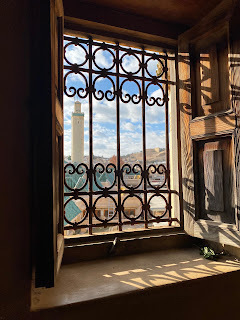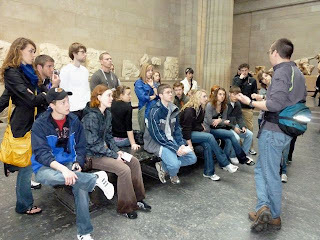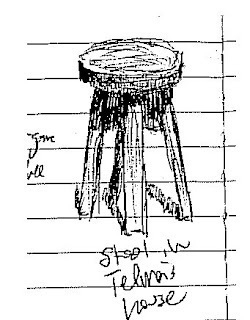traveling
∞
How to Make the Most of Studying Abroad
A new short article I've published on Medium, about making the most of re-entry after you've studied abroad. It's the same advice I'd give anyone who has traveled, if they want to keep getting the benefits of travel even after they've returned.
I've written a few other posts about this topic here on Slowperc. You can find them here.
If you want to subscribe to my Medium articles, here's a simple way you can do so. A portion of your subscription fee goes to support my writing, so thanks in advance.
∞
When You Come Home From Studying Abroad
It being the end of our January term, Augustana College students have just returned from studying abroad in Thailand, Cuba, India, New Zealand, touring Europe, and elsewhere. We place a high value on study abroad, because when you return, you can never see the world the same again.
We think that when Americans study abroad, that's good for the whole world because it helps Americans to see America as they could not see it otherwise.
Of course, it's not without its costs. Our students who have just come back are jetlagged and road-weary. Many are a little deeper in debt. And the new term is about to begin.
That being the case, let me offer some advice to those of you who are returning from studies abroad. I know you're tired, so I'll be brief:
1) Get some rest. Stay up until it's dark out, and then sleep deeply. Get back in sync with the sun on this side of the world.
2) Journal every day. Trust me. Do this. Do it now. Don't put it off. Your memories are already fading. Get it down. Write however you want - impressionistically, narratively, whatever. Write about all five senses. Write about language. Write about the people you were with, and write their names down. Write down names of places, hotels, restaurants, museums. Do it now. Go.
3) Tell stories. To anyone who will listen. Storytelling is one of our oldest and best ways of sharing our experiences. Enrich your classmates and professors who couldn't join you. Tell us what you saw, what surprised you. Tell us anecdotes about specific times, places, meals, people, vehicles. Give us detail. As you do, you will nourish your own memories, and you'll sort out what matters most to you. As Umberto Eco once wrote,
4) Come up with a couple of one-liners. This is how to prepare for the inevitable question, "How was India?" If you say "It was amazing!" the conversation is over and the opportunity is gone. Instead, try something like "I never had food like the food I had in Delhi!" or "I wish you could have seen the quality of the rivers" or "The best day was the fourth day." If the questioner was just being polite, that will satisfy them. But these specific memories, offered as one-liners, are invitations to further conversation. They are a way of saying "Would you like to know more?"
You had a great experience. Some of it was wonderful, some was no doubt very difficult. This is why we go. Now, you've brought it home. Do what you can to preserve the memories, and to share them with the rest of us.
So welcome home! And now, go get some sleep. (And then you can read Part Two of this post.)
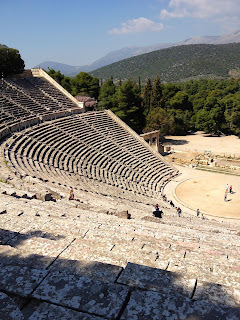 |
| Epidauros |
We think that when Americans study abroad, that's good for the whole world because it helps Americans to see America as they could not see it otherwise.
Of course, it's not without its costs. Our students who have just come back are jetlagged and road-weary. Many are a little deeper in debt. And the new term is about to begin.
That being the case, let me offer some advice to those of you who are returning from studies abroad. I know you're tired, so I'll be brief:
1) Get some rest. Stay up until it's dark out, and then sleep deeply. Get back in sync with the sun on this side of the world.
2) Journal every day. Trust me. Do this. Do it now. Don't put it off. Your memories are already fading. Get it down. Write however you want - impressionistically, narratively, whatever. Write about all five senses. Write about language. Write about the people you were with, and write their names down. Write down names of places, hotels, restaurants, museums. Do it now. Go.
3) Tell stories. To anyone who will listen. Storytelling is one of our oldest and best ways of sharing our experiences. Enrich your classmates and professors who couldn't join you. Tell us what you saw, what surprised you. Tell us anecdotes about specific times, places, meals, people, vehicles. Give us detail. As you do, you will nourish your own memories, and you'll sort out what matters most to you. As Umberto Eco once wrote,
"One who tells stories must have another to whom he tells them, and only thus can he tell them to himself."*And perhaps most importantly,
4) Come up with a couple of one-liners. This is how to prepare for the inevitable question, "How was India?" If you say "It was amazing!" the conversation is over and the opportunity is gone. Instead, try something like "I never had food like the food I had in Delhi!" or "I wish you could have seen the quality of the rivers" or "The best day was the fourth day." If the questioner was just being polite, that will satisfy them. But these specific memories, offered as one-liners, are invitations to further conversation. They are a way of saying "Would you like to know more?"
You had a great experience. Some of it was wonderful, some was no doubt very difficult. This is why we go. Now, you've brought it home. Do what you can to preserve the memories, and to share them with the rest of us.
So welcome home! And now, go get some sleep. (And then you can read Part Two of this post.)
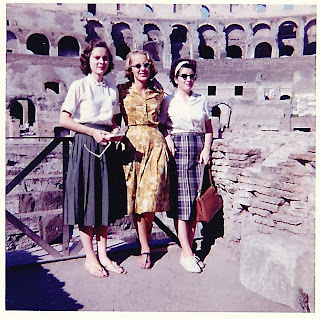 |
| My mother in Rome during her college years. |
*****
*Umberto Eco, Baudolino, (New York: Harcourt, 2002) p.
207.
∞
On Traveling and Journaling
It's been too long since I've blogged. My excuse? I've been traveling a lot, including quite a bit with students. In the last few months I've been in Belize, Guatemala, Greece, and the UK with my students.
This probably sounds like a dream life, and I have to admit it's not all that bad.
But it's also a lot of work. A weeklong class in Greece usually takes me a little over a year to prepare, and in the semester leading up to it the workload approaches the amount of preparation I do for any of my other classes. Last fall I was teaching my usual load plus prepping two study-abroad courses, so I was swamped much of the time.
But it's worth it. My students come back with perspectives they could not have gained at home, if their journals are to be believed.
I always require my students to keep a journal while we're traveling. Sometimes I ask them specific questions, but usually I tell them to journal not for me but for themselves. You may think this naive, and you may be right. But I'd rather be naive than cynical. That is, I'd rather appeal to their self-interest and to their own sense of themselves as growing learners than force them to write answers to my pre-fab questions.
I do give them some guidance, however. Here are some of the things I teach them about journaling:
1) Pay attention to the little things, and write down whatever catches your attention. If you noticed it, it probably matters.
2) Pay attention to all of your senses. We tend to write about major events that happened, as though we were news reporters looking for the big story. But why not write about the smells? What sounds do you hear? What do the birds or the streets or the nighttimes sound like? How does the place you're in feel on your skin? What new tastes have you encountered? And so on.
3) Write continuously. Don't plan to write a sketch or outline and then fill it in later. As soon as you are on that plane home you will begin to forget what you experienced, and you will forget far more quickly than you want to believe. Write now.
4) Write "gestures" and impressions. Some of us have very good prose composition skills, and some of us do not. But all of us can write down a few phrases, a few adjectives, a few words we've heard in passing. Why not include entries in which you stand in one place and write down a list of nouns, of verbs, of adjectives that strike you as you soak the place in?
5) Draw pictures. This is one of the best pieces of advice I've ever received, and I am no artist. Cameras are great, but they capture what they see. Drawing captures what you see. Drawing also forces you to see what you wouldn't have seen otherwise. As Louis Agassiz once said, a pencil is one of the best tools for seeing. One of the best drawing tools I know of is a cheap ball-point pen. You don't need fancy paper, and you don't need a lot of time. Most of my best journal drawings are made in under two minutes with a cheap pen.
Try this out, and see if it doesn't completely change your journals. When I'm in Greece, I like to show my students the different kinds of stonework in ancient walls. The kind of stonework is helpful for dating the site, and it tells us a lot about the technology of the people who built the walls. I've found that as I try to draw a section of wall, the differences between cyclopean walls, Lesbian walls, and Roman walls become clearer to me, I remember them better, and I am better able to teach about them.
6) Revisit your journal periodically. Last of all, when you get back, revisit your journal from time to time. Start off doing so every week, and then every month and every year. When you revisit it, add a page or two of notes. What does your experience traveling back then mean to you now? Traveling is a luxury some of us enjoy, but it can also be a valuable learning opportunity, one that continues to be valuable for as long as we continue to reflect on it.
Do you have other journaling tips? I'd love to hear them. Meanwhile, I've got to get back to preparing for my next trips and courses abroad.
Buen viaje!
This probably sounds like a dream life, and I have to admit it's not all that bad.
But it's also a lot of work. A weeklong class in Greece usually takes me a little over a year to prepare, and in the semester leading up to it the workload approaches the amount of preparation I do for any of my other classes. Last fall I was teaching my usual load plus prepping two study-abroad courses, so I was swamped much of the time.
But it's worth it. My students come back with perspectives they could not have gained at home, if their journals are to be believed.
I always require my students to keep a journal while we're traveling. Sometimes I ask them specific questions, but usually I tell them to journal not for me but for themselves. You may think this naive, and you may be right. But I'd rather be naive than cynical. That is, I'd rather appeal to their self-interest and to their own sense of themselves as growing learners than force them to write answers to my pre-fab questions.
I do give them some guidance, however. Here are some of the things I teach them about journaling:
1) Pay attention to the little things, and write down whatever catches your attention. If you noticed it, it probably matters.
2) Pay attention to all of your senses. We tend to write about major events that happened, as though we were news reporters looking for the big story. But why not write about the smells? What sounds do you hear? What do the birds or the streets or the nighttimes sound like? How does the place you're in feel on your skin? What new tastes have you encountered? And so on.
3) Write continuously. Don't plan to write a sketch or outline and then fill it in later. As soon as you are on that plane home you will begin to forget what you experienced, and you will forget far more quickly than you want to believe. Write now.
4) Write "gestures" and impressions. Some of us have very good prose composition skills, and some of us do not. But all of us can write down a few phrases, a few adjectives, a few words we've heard in passing. Why not include entries in which you stand in one place and write down a list of nouns, of verbs, of adjectives that strike you as you soak the place in?
5) Draw pictures. This is one of the best pieces of advice I've ever received, and I am no artist. Cameras are great, but they capture what they see. Drawing captures what you see. Drawing also forces you to see what you wouldn't have seen otherwise. As Louis Agassiz once said, a pencil is one of the best tools for seeing. One of the best drawing tools I know of is a cheap ball-point pen. You don't need fancy paper, and you don't need a lot of time. Most of my best journal drawings are made in under two minutes with a cheap pen.
Try this out, and see if it doesn't completely change your journals. When I'm in Greece, I like to show my students the different kinds of stonework in ancient walls. The kind of stonework is helpful for dating the site, and it tells us a lot about the technology of the people who built the walls. I've found that as I try to draw a section of wall, the differences between cyclopean walls, Lesbian walls, and Roman walls become clearer to me, I remember them better, and I am better able to teach about them.
6) Revisit your journal periodically. Last of all, when you get back, revisit your journal from time to time. Start off doing so every week, and then every month and every year. When you revisit it, add a page or two of notes. What does your experience traveling back then mean to you now? Traveling is a luxury some of us enjoy, but it can also be a valuable learning opportunity, one that continues to be valuable for as long as we continue to reflect on it.
Do you have other journaling tips? I'd love to hear them. Meanwhile, I've got to get back to preparing for my next trips and courses abroad.
Buen viaje!
